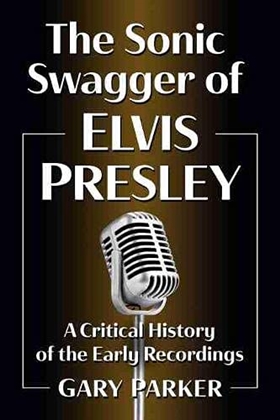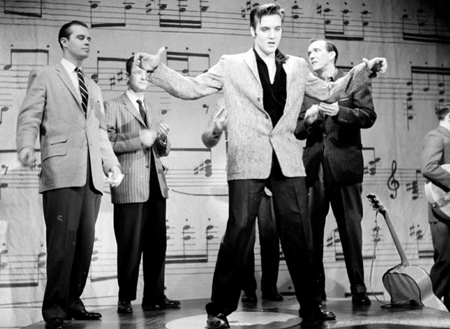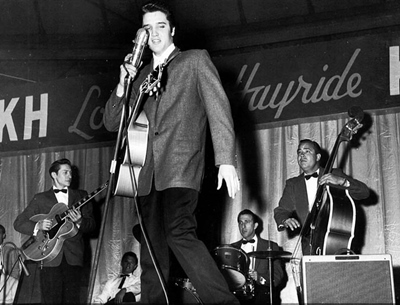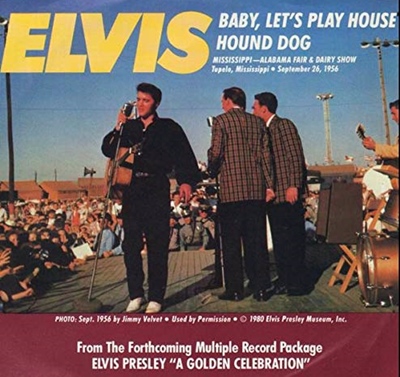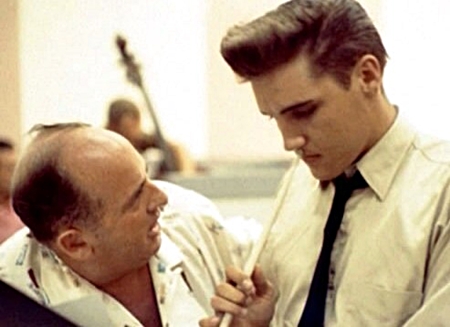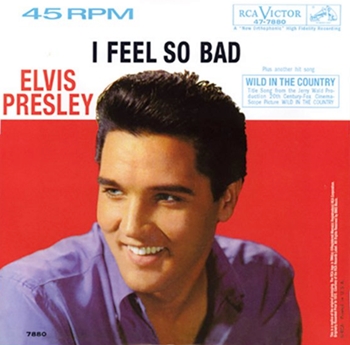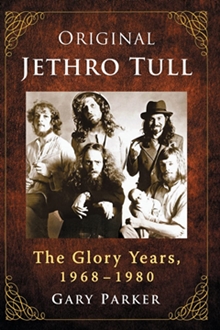 |
 |

The Interview EIN: Gary, before we discuss your new book, who is Gary Parker? GP: Raconteur, rapscallion and bon vivant. But seriously, I'm a former Silicon Valley technical writer, who since his retirement, has been able to focus on writing things that actually interest me. After a period of concentrating on fiction, I've recently turned to music, which has provided me with an opportunity to not only share my perspectives on artists that I admire, but also to connect with celebrated musicians who have contributed so much to the music that has impacted my life. In short, it's been a kick. EIN: The Sonic Swagger of Elvis Presley is a great, evocative title. What gave you the idea for the book and how did you arrive at its title? GP: I first became aware of Elvis Presley as young boy, during a period when Presley was incandescent on stage and unbeatable on record. In fact it was Elvis who triggered my lifelong love of music. Having said that, I've always been intrigued by Presley's inherent contradictions; was the “true Elvis” a balladeer with a subsidiary interest in rhythm and blues, or was it the other way around? Was Presley the bold musical innovator of the 1950’s who single-handedly upended the music world or the tamed figure who emerged from the Army in 1960 with a goal of cranking out frothy musicals? Was he the seemingly fearless rock & roll rebel who, in the eyes of many, threatened the moral order of the 1950’s, or the stricken figure who cried “Everything I have is gone,” upon the death of his beloved mother? In the years since his death in August of 1977, the rise-and-fall-arc of Presley’s musical and personal life has inspired hundreds of books, movies, documentaries and commentaries, many purporting to sort out the contradictions that characterized his life and reveal “the real Elvis.” Having consumed many of these and having interviewed musicians who knew and worked with Presley, I can honesty I'm no closer to figuring out who Elvis really was than when I started writing the book over two years ago. And truth be told, it's occurred to me that the multiple sides of Elvis' personality might in fact explain the ongoing fascination that the world still has for him.
EIN: How did you approach the book in terms of researching and writing? GP: In many ways, I've been researching the life and music of Elvis Presley for much of my life. I first became a fan as a very young boy, having first seen him on the Ed Sullivan Show in 1957. From there, I took a deep dive into his music and I was hooked. Years later, I was present in Las Vegas in the summer of 1969 for his return to live performance and saw him numerous times following that. In addition to my personal background, I've engaged in more traditional research: plowing through newspaper archives covering Presley's early years, (with a heavy emphasis on the now-defunct Memphis Press-Scimitar, to which I was granted complete access by the current copyright holders), interviewing musicians and friends who knew and worked with Elvis including Ray Walker, Bob Moore and James Kirkland and of course, spending the requisite amount of time pouring over the works of such esteemed chronicler's of Presleyana as Peter Guralnick, Griel Marcus, Ernst Jorgenson and many others. EIN: What can readers expect when reading the book? GP: To find that the emphasis of The Sonic Swagger of Elvis Presley is on Presley's most cogent music (released between the years of 1954 and 1958) and on the men who created it: Elvis Presley, Scotty Moore, Bill Black and of course, Sam Phillips. EIN: Gary, how will it differentiate itself from other books about Elvis' music? GP: Well, for a start, I can't think of another book purporting to cover Presley's music that actually contains a chapter entitled "The Men As Musicians," which, in addition to analyzing the musicianship of Elvis, Scotty Moore, Bill Black and D.J. Fontana, also contains testimonial's from some of the world's most prominent musician's as to the influence Elvis and his group had on them. I also examine Elvis' curious and life-long habit of discounting his guitar playing.... which I find curious... after all, Presley's ego once reached such towering heights that he boasted of being able to alter weather patterns, but despite this, he never passed up an opportunity to criticize his own guitar playing. The fact is, Elvis was a fine rhythm guitar player.
How else is my book different from other Presley chronicles? Well in addition to avoiding any prolonged discussion of Elvis' personal life (I simply have no interest in sensationalism and besides, my emphasis is on music), my book, in addition to chronicling Elvis' seismic impact on popular music, also examines the considerable contributions made to Presley's music by Scotty Moore and Bill Black, men who are too often overlooked. Oh, and another thing that makes my book different from other Presley chronicles: it contains an examination at the work and career of one Presley's most accomplished and seldom-praised collaborators: Hank Garland, who succeeded Scotty Moore as Presley's lead guitarist in the early 1960's, and whose life ended tragically.
EIN: In The Sonic Swagger of Elvis Presley you discuss how Elvis synthesised traditional country with gospel and the rhythm and blues of the muddy Mississippi delta plains. What is your broad perspective on this? GP: Gospel, rhythm and blues and country are the trio of tributaries that when united, forged the essence and power behind Elvis' music. When it’s all said and sifted, Presley’s deft manipulation of these disparate influences into a swirlingly innovative mixture of hair-raising rock & roll and balladry, remains, to my mind, as one of the music world’s true miracles. As his musical collaborator J.D. Sumner once observed, “One day, there won’t be any more pop or country or rhythm and blues. It’ll just be named American music and Elvis Presley did as much to make it that as anyone who ever lived.” If artists, as I fervently believe, are to be judged, by their best work, Elvis Presley stands tall as a musical innovator of the first order, a man who not only changed musical history, but, as the record clearly shows, history itself.
EIN: Elvis’ Sun versus RCA recordings. What is their respective importance/significance? GP: It's simply impossible to overstate the historical importance of Presley's early Sun sides. Song's like "That's All Right," "Baby Let's Play House" and "Good Rockin' Tonight" not only brought rhythm and blues to an audience only marginally familiar with R&B, but kickstarted a musical revolution whose impact is still being felt today. And it goes without saying, influenced a generation of musicians to follow. Having said that, Presley's RCA work between 1956 and 1958 is nearly equally impressive. Embracing a more robust and driving sound, Presley morphed rockabilly into true rock and roll and produced music as consequential as any in the history of popular music. In many ways, between the years of 1956 and 1958, Elvis would sound fresher and more alive than in any of the years that would follow.
Col Parker still meddling, at Elvis' last fifties RCA session, June 1958
EIN: In your book, do you discuss the role of Colonel Parker in relation to Elvis’ recordings? GP: When it comes to the Colonel's influence on Elvis' music, I frankly find little good to say. Parker was completely bereft of music insight and clearly had no understanding of rock and roll and its appeal. His curt treatment of two men critical to Presley's early success - Scotty Moore and Bill Black -- is indefensible. And it's simply a fact that by shoehorning Elvis into a succession of increasingly awful Hollywood musicals, he nearly destroyed Presley's career. EIN: Gary, the focus of the book is Elvis' 1950s recordings. What is your view about Elvis' recordings in the subsequent decades of his career as a recording artist? GP: I was initially enthralled by Presley's late-60's comeback. Tracks like If I Can Dream, In The Ghetto and Suspicious Minds seemed to suggest that Elvis had shaken off the torpor that characterized his movie soundtrack work and less-inspired non-soundtrack work. Having said that, my book contains a chapter entitled "Diamonds Amidst the Dross," in which I list what I consider to be Elvis' most compelling 1960's sides. Tracks like His Latest Flame, A Mess of Blues, and I Feel So Bad can clearly stand shoulder-to-shoulder with anything that Elvis produced during his peak years of 1954 through 1958.
EIN: Did researching the book change your view or understanding of Elvis' music in any way? GP: Certainly, particularly in the area of R&B and it's early (and often overlooked) practitioners, such as Junior Parker, "Jazz" Gillum, John Lee Hooker and Arthur Crudup and their early and sizable influence on Elvis and his music. And I confess to underestimating the influence of the Shake Rag region of east Tupelo and its musical heritage on Elvis' music, not to mention the influence of the Pentecostal churches of Tupelo on Elvis' later stage persona. EIN: Are you doing book signings and/or other promotional activities for the book’s release? GP: Lotsa upcoming promotional things in the works. Britain's Vintage Rock Magazine has committed to publishing a series of extracts from the book throughout 2022, and reviews are slated for a number of international music magazines once the book's published, (no later than early March). I'm also scheduled for interviews with a number of Elvis-related websites in the next few weeks. EIN: Gary, you write both fiction and non-fiction. Do you have a preference? GP: Non-fiction, without a doubt. I'm currently working on a book chronicling the music of the solo Beatles and in so doing, I've been fortunate enough to connect with many prominent musicians who worked closely with John Lennon, Paul McCartney, George Harrison and Ringo Starr. It's been a kick hearing anecdotes and insider info related to these sessions, some of which have never been published before.
EIN: One of your releases, The Fourth Order, won the Southern California Writer's Conference Outstanding Fiction award, and you have also written, Original Jethro Tull: The Glory Years, 1968-1980. Jethro Tull is one of the longest surviving and most idiosyncratic rock bands of all-time. Please tell us about this book and what attracted you to the subject. GP: Original Jethro Tull attempts to establish that Jethro Tull between the years of 1968 and 1980 was in fact, a collection of five talented musicians and not simply a group of sidemen supporting group leader Ian Anderson. During the course of writing the book, I was able to interview virtually every key member of the band, including Ian Anderson, Martin Barre, Jeffrey Hammond, Dee Palmer and Dave Pegg, among others, which allowed them to tell the history of the band through their own eyes. The book also contains a very humorous recounting of Jethro Tull actually attending a performance of Elvis during his 1969 stint at the International Hotel in Las Vegas, which is frankly, hilarious. The book has been very well received and received an Award for Excellence from the U.S. Library of Congress and the Association of Recorded Sound Collections (ARSC). EIN: Gary, is there anything else you would like to say EIN readers? G.P. Well, aside from wishing all my fellow Elvis fans well, I hope they'll find my book to be of interest, to be honest and of course, worthwhile. And of course, thanks for the opportunity for allowing me to share my thoughts on Elvis with EIN readers. EIN: Gary, thank you very much for talking with EIN. We wish you all the best with The Sonic Swagger of Elvis Presley. Visit Gary Parker’s official site here
Check out Nigel Patterson's other recent Elvis Interviews ..
|
|

